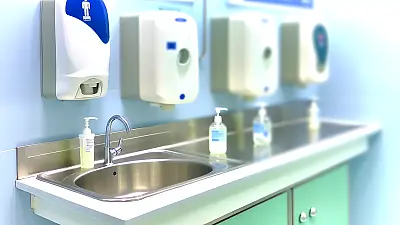MOUNT PLEASANT, PA - Harmon House Care Center's quality assurance committee has proven ineffective at maintaining compliance with federal regulations regarding intravenous therapy administration, according to a recent federal inspection that revealed ongoing systemic failures in the facility's oversight processes.

Quality Committee Oversight Breakdown
The June 2025 inspection documented a critical failure in the facility's Quality Assurance and Performance Improvement (QAPI) committee, which is responsible for ensuring the nursing home maintains compliance with all federal health and safety regulations. Federal inspectors found that despite repeated citations for IV therapy violations, the committee failed to implement effective corrective measures.
This represents a fundamental breakdown in the facility's internal oversight system, as QAPI committees serve as the primary mechanism for identifying problems, developing solutions, and monitoring compliance improvements. When these committees fail to function properly, residents face increased risks from recurring safety violations.
Pattern of Repeated Violations
The inspection revealed a troubling pattern spanning multiple surveys. Harmon House Care Center had previously been cited for infection control deficiencies during inspections ending June 27, 2024, and April 22, 2025. Despite submitting plans of correction that promised to conduct audits and report results to the QAPI committee for review, the facility continued to experience compliance problems with IV therapy protocols.
Intravenous therapy violations can pose serious health risks to nursing home residents, who are often elderly and immunocompromised. Proper IV administration requires strict adherence to sterile techniques, appropriate catheter maintenance, and careful monitoring for signs of infection or complications. When these protocols are not followed consistently, residents may develop bloodstream infections, catheter-related complications, or medication errors that can be life-threatening.
Medical Significance of IV Therapy Compliance
Intravenous therapy in nursing homes typically involves administering medications, fluids, or nutrition directly into residents' bloodstreams. This route of administration bypasses the body's natural barriers against infection, making strict infection control protocols essential. Medical standards require facilities to maintain sterile conditions during IV insertion, use proper hand hygiene, regularly assess IV sites for complications, and follow established protocols for catheter care and replacement.
When facilities fail to maintain these standards, residents face elevated risks of central line-associated bloodstream infections (CLABSIs), catheter-related thrombosis, and infiltration injuries where IV fluids leak into surrounding tissues. These complications can lead to extended hospital stays, additional medical interventions, and in severe cases, life-threatening sepsis.
Industry Standards for Quality Oversight
Federal regulations require nursing homes to establish QAPI committees that meet regularly to review facility performance, identify areas for improvement, and implement corrective actions. These committees must include the facility's medical director, director of nursing, and administrator, along with other key staff members. When functioning properly, QAPI committees serve as an early warning system to prevent recurring violations and ensure continuous quality improvement.
The committee should have analyzed the root causes of the repeated IV therapy violations, developed comprehensive corrective action plans, and implemented monitoring systems to prevent future occurrences. Industry best practices suggest that effective QAPI committees conduct thorough incident analysis, provide additional staff training when needed, and establish ongoing monitoring protocols to ensure sustained compliance.
Systemic Oversight Failures
The inspection findings suggest that Harmon House's QAPI committee was not fulfilling its regulatory responsibilities. Despite promises to conduct audits and review results, the facility continued experiencing IV therapy compliance problems, indicating that either the audits were not conducted properly, the results were not adequately analyzed, or corrective actions were insufficient.
This type of oversight failure represents a serious concern because it suggests the facility lacks effective internal mechanisms for identifying and correcting safety problems. When QAPI committees fail to function properly, nursing homes may experience recurring violations that could have been prevented through proper oversight and quality improvement processes.
Additional Issues Identified
The inspection also referenced broader infection control practice deficiencies that had been cited in previous surveys, suggesting ongoing challenges with maintaining proper protocols across multiple areas of resident care beyond IV therapy administration.
The recurring nature of these violations, combined with the QAPI committee's failure to address them effectively, raises concerns about the facility's overall commitment to regulatory compliance and resident safety. Federal regulations exist specifically to protect vulnerable nursing home residents, and facilities must maintain robust internal oversight systems to ensure these protections remain in place.
Full Inspection Report
The details above represent a summary of key findings. View the complete inspection report for Harmon House Care Center from 2025-06-05 including all violations, facility responses, and corrective action plans.
💬 Join the Discussion
Comments are moderated. Please keep discussions respectful and relevant to nursing home care quality.